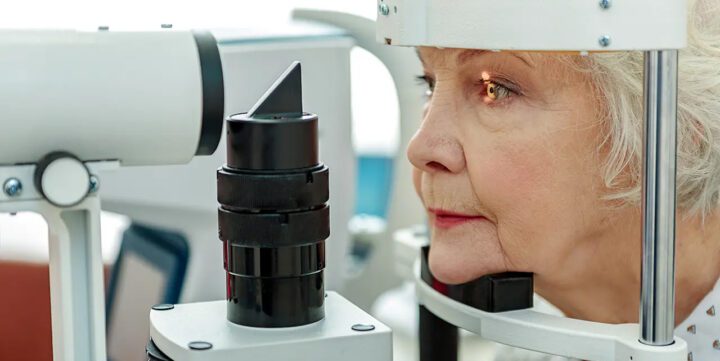Course Spotlight: Diabetic Eye Disease
September 1, 2024
Macular Disease on the Rise
As Australia grapples with an ageing population, the prevalence of macular disease is on a concerning rise, presenting significant challenges and opportunities for the medical community. Macular disease, encompassing a spectrum of conditions that affect the central retina, is the leading cause of blindness and severe vision loss in the country. For health professionals, understanding and addressing this silent epidemic is critical not only for individual patient care but also for the broader implications on public health.
Macular disease disrupts the ability to perform everyday tasks—reading, driving, recognising faces — by impairing detailed central vision. Despite advancements in medical technology and treatment options, the increasing incidence of age-related macular degeneration (AMD) and diabetic retinopathy (DR) underscores an urgent need for comprehensive strategies and upskilling within the healthcare sector.
Currently, it is estimated that around 8.5 million Australians over the age of 50 are at risk of macular disease, with over 1.7 million already showing some evidence of the condition. The two most prevalent macular diseases in Australia are age-related macular degeneration (AMD) and diabetic retinopathy (DR), including diabetic macular edema (DME). AMD alone affects approximately 1.29 million older Australians, while 300,000 to 400,000 individuals have some degree of DR. As the population ages, these numbers are expected to rise, significantly impacting both social and economic aspects of life. Without effective prevention and treatment, projections estimate that 1.7 million Australians will exhibit signs of AMD by 2030. The financial burden of vision loss, excluding the loss of well-being, was estimated at $7.2 billion in 2009. Addressing avoidable vision loss due to macular disease could substantially reduce these associated costs.
Demand Exceeding Supply
Back in August 2018, Australia had around 1,020 registered ophthalmologists, with about 84% of them working in major cities. Similarly, there were roughly 5,361 active optometrists, most of whom were also based in urban areas. This uneven distribution of eye health professionals highlights a significant challenge: access to care is much harder for people living in remote and very remote regions. Fortunately, the Visiting Optometrist Scheme (VOS) has made a difference, particularly for Indigenous patients, with services tripling from 6,975 in 2009-10 to 24,511 in 2016-17.
Macular disease and the vision loss it causes can have a deep impact on individuals, their families, and entire communities. It’s not just about the physical loss of sight — there’s an emotional toll, financial strain, and social consequences too. People may experience reduced independence, increased social isolation, and even mental health challenges. Everyday activities become harder, managing chronic diseases and sticking to medication regimens becomes more difficult, and there’s a higher risk of injury. Plus, it can affect a person’s ability to work, which adds to the broader economic impact. Both direct healthcare costs and indirect costs related to well-being and productivity are significant for those living with macular disease and their carers.
Common Macular Diseases
Age-related macular degeneration (AMD) is the most common form of macular disease, affecting one in seven Australians over 50. This condition deteriorates the macula, leading to significant vision loss and impairing activities that require sharp central vision, such as reading and recognising faces.
Diabetic retinopathy (DR), including diabetic macular oedema (DMO), is a serious complication of diabetes and the leading cause of preventable blindness among working-aged Australians. Everyone with diabetes is at risk of developing DR, with the likelihood increasing over time. DR damages retinal blood vessels, leading to vision impairment and potential blindness if untreated.
Other conditions impacting the macula include retinal vein occlusion (RVO), which occurs when a retinal vein becomes blocked, leading to vision problems. Myopic macular degeneration, caused by severe nearsightedness, and Macular Telangiectasia (MacTel), a rare condition involving abnormal blood vessel growth, also contribute to vision loss.
Inherited macular diseases, though rare, affect children and younger individuals. Examples include Stargardt Disease, leading to progressive vision loss, and Best Disease, typically beginning in childhood or adolescence.
Additional macular conditions that may require surgical or non-surgical management include macular holes, macular pucker (epiretinal membrane), vitreomacular traction syndrome, retinal detachment, and central serous chorioretinopathy. These conditions can cause vision distortion, blurred vision, or fluid accumulation under the retina.
The Macular Disease Foundation Australia
The Macular Disease Foundation Australia (MDFA) represents the 8.5 million Australians living with or at risk of macular disease, along with their families. Macular disease, which is the leading cause of severe vision loss and blindness in Australia, includes conditions that affect the macula. Founded in 2001 by Dr. Paul Beaumont AM, MDFA was created as a patient-focused, independent, and trusted organisation dedicated to supporting those dealing with or at risk of macular disease.
The mission of the MDFA is simple: reduce the incidence and impact of macular disease. They do this by leading efforts in prevention, early detection, disease management, advocacy, and research, working closely with the community, health professionals, researchers, and government to make a real difference.
One of the key achievements of the MDFA has been spearheading the development of the National Strategic Action Plan for Macular Disease. Partnering with the Australian Government and stakeholders from across the eye health sector, together created a blueprint, which outlines a shared vision for reducing the impact of macular disease. The plan is designed to better coordinate resources across all levels of government, ensuring they are directed where they are most needed.
Diabetic Eye Disease, for GPs
The Macular Disease Foundation Australia is offering an insightful webinar on Diabetic Eye Disease – A GP’s Perspective, featuring esteemed speakers, Associate Professor Peter van Wijngaarden, an ophthalmologist and Deputy Director of the Centre for Eye Research Australia, and Dr. Gary Deed, a specialist GP and Chair of the RACGP Diabetes Specific Interests Committee. The webinar provides crucial information on diabetic eye disease (DED) tailored specifically for general practitioners.
This one-hour online education session is a CPD Activity under the RACGP CPD Program, approved for 2 CPD points, and is offered at no cost. Participants will gain valuable insights into the varied clinical presentations of diabetes-related eye and vision issues, understand the risk factors for the development and progression of diabetic retinopathy, and learn to identify effective multidisciplinary referral pathways for patients with or at risk of this condition.
Join us for this opportunity to enhance your knowledge, improve patient outcomes, and stay at the forefront of diabetic eye disease management.
For more information or to register your interest, see https://app.medcpd.com/courses/4012
Australian Government Department of Health. (2005). National Framework for Action to Promote Eye Health and Prevent Avoidable Blindness and Vision Loss.
World Health Organization. (2013). Universal Eye Health: a global action plan 2014-2019.












